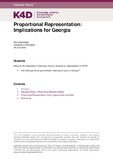Proportional Representation: Implications for Georgia
Abstract
In a process that spanned over three years, Georgia adopted some important changes to its constitution that is meant to complete the country’s transition from a “semi-presidential to a parliamentary system of governance” (Civil.ge, 17 Dec. 2018). In the last 2020 parliamentary elections, Georgia’s current (revised) electoral mixed system was already the most proportional the country had seen in three decades (Bogishvili, 2020). 120 Members of Parliament (MPs) were elected proportionally by a party list (previously the number was 77) and the remaining 30 were single mandate (majoritarian) MPs elected by the ‘first-past-the-post’ rule (previous number was 73) (Bogishvili, 2020; OSCE, 2021, p.6). However, in the next parliamentary elections, due to take place in 2024, Georgia is meant to move to a fully proportional system (Civil.ge, 17 Dec. 2018).
This rapid review explores some of the questions surrounding proportional representation in Georgia. In particular, what do these constitutional changes mean for Georgia? What might be some of the implications of Georgia’s move to proportional representation in 2024 and how might this affect governance?
The report examines some of the main aspects of these constitutional changes during 2017-20 and puts them in context. It outlines some of the main discussions in Georgia concerning opportunities and challenges often associated with proportional representation and highlights some of the main points that emerge from these discussions on the future dynamics of governance in Georgia.
Material summarised in this report is based on a mixture of (online) newspaper articles, government and other reports, and policy, and practitioner-based literature.
Citation
Kemoklidze, Nino (2022). Proportional Representation: Implications for Georgia. K4D Helpdesk Report. Institute of Development Studies. DOI: 10.19088/K4D.2022.111DOI
10.19088/K4D.2022.111Is part of series
K4D Helpdesk Report;1169Rights holder
© Crown copyright 2022Sponsor
Foreign, Commonwealth and Development Office (FCDO)Collections
- K4D [937]

